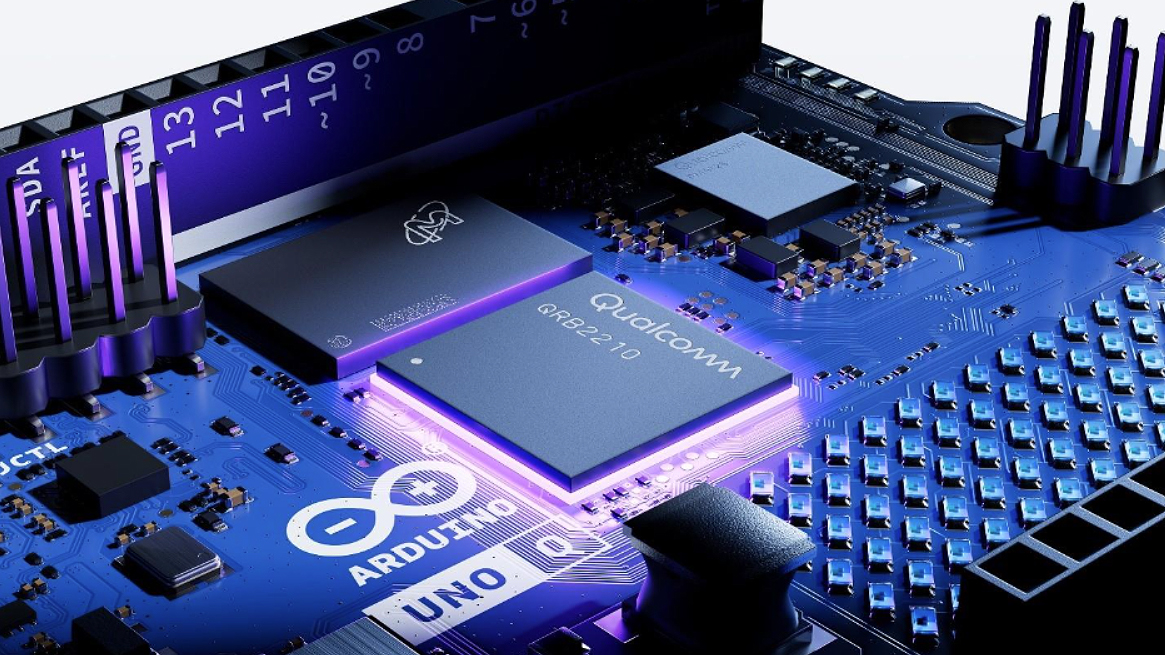Qualcomm acquires Arduino to make AI development more accessible — microcontroller maker's hardware becomes the foundation of mobile tech giant's edge AI stack
Arduino community gets access to Qualcomm hardware and software resources for rich AI projects

Recent AI market plays have produced all sorts of inter-company investments and flat-out acquisitions. Most of those are somewhat predictable, but occasionally an unexpected deal comes out of left field. Mobile chip giant Qualcomm is acquiring microcontroller expert Arduino for an undisclosed sum. Along with its acquisition, Qualcomm also announced a new Arduino Uno Q board and Arduino App Lab IDE software.
The chipmaker claims that buying Arduino allows it to deliver "a full-stack edge platform," or in other words, edge-device AI, with Arduino microcontrollers as the hardware piece of that puzzle. That would make a measure of sense, given Qualcomm's remarks that this acquisition should dovetail nicely with its acquisitions of the Edge Impulse IoT AI platform and IoT DevOps provider Foundries.io.
Since its founding in the mid-2000s, Arduino has grown to become the default option for anyone wanting an affordable microcontroller, thanks to the open-source design of the hardware and software. The devices spawned thousands of clones and an immense community that makes it exceedingly simple for newcomers to join in. The main distinction between an Arduino and a Raspberry Pi is the former is microcontroller based, the latter being a micro-computer. Though, Raspberry Pi has entered the microcontroller scene with its Raspberry Pi Pico, powered by its own RP2040 and RP2350 custom silicon.
The immediate question likely to be on most enthusiasts' minds, then, is what will happen to Arduino now that it's owned by one of the largest technology companies on the planet. For its part, Qualcomm states that Arduino will "preserve its open approach and community spirit" and "retain its independent brand, tools, and mission".
While that statement sounds good at face value, Qualcomm's (in)famous legal team might take umbrage with the amount of "-duino" clones out there. The Arduino ecosystem is a free-for-all (in a good way), and if Qualcomm adds any barriers to Arduino device usage, like forced product registrations or more restrictive licensing, that could put a significant chill on the project.
The devices themselves (and their clones) are ubiquitous and can be found most anywhere that sells electronic components and even big-box retailers. Any tightening of the supply chain or preferential resellers would also carry a negative impact.
Having said all that, there's no denying that having immediate and direct access to Qualcomm's technology and resources might prove a substantial benefit to Arduino. Chips and designs ought to be far easier to source, and Qualcomm's weight in purchasing components could result in even more affordable or better-performant Arduino devices.
Get Tom's Hardware's best news and in-depth reviews, straight to your inbox.
As for the new Arduino Uno Q, it marries a Qualcomm DragonWing QRB2210 CPU that's capable of running Debian Linux with an STM32U585 microcontroller. This is the first Arduino product meant to work with the new Arduino App Lab, an IDE for Real-time OS, Linux, and Python — though it's apparently not yet available in the Arduino downloads section.
The price points, although likely justifiable, are encroaching on Raspberry Pi territory. The Uno Q comes in two variants: one with 2 GB of RAM and 16 GB of eMMC storage, for $44 or 39€, that can be preordered today and will ship on October 25; the other with 4 GB of memory and 32 GB of storage for $59 or 53€. If you fancy the higher-end model, you should be able to order it in November, though the release date is currently set to "end of year." Let's hope Qualcomm continues to invest in the Arduino ecosystem and maintains its open spirit.
Follow Tom's Hardware on Google News to get our up-to-date news, analysis, and reviews in your feeds. Make sure to click the Follow button.

Bruno Ferreira is a contributing writer for Tom's Hardware. He has decades of experience with PC hardware and assorted sundries, alongside a career as a developer. He's obsessed with detail and has a tendency to ramble on the topics he loves. When not doing that, he's usually playing games, or at live music shows and festivals.
-
bit_user I wonder if Broadcom will respond by buying the Raspberry Pi company. It seems to me that the Pi might soon outgrow Broadcomm SoCs, as what started out as a marriage of convenience has now been holding back the Pi for a few generations, already.Reply -
bit_user Reply
Arduino doesn't make their own microcontrollers. Here's a list of their official boards:The article said:The chipmaker claims that buying Arduino allows it to deliver "a full-stack edge platform," or in other words, edge-device AI, with Arduino microcontrollers as the hardware piece of that puzzle.
https://en.wikipedia.org/wiki/List_of_Arduino_boards_and_compatible_systems#Official
With a few exceptions, their boards use microcontrollers from Microchip Technology, who bought Atmel in 2016.
Even this board is using a microcontroller from ST Microelectronics.The article said:As for the new Arduino Uno Q, it marries a Qualcomm DragonWing QRB2210 CPU that's capable of running Debian Linux with an STM32U585 microcontroller.
I've never personally used Arduino stuff, but I gather their main value-add is the board spec and development tools. This fostered a whole ecosystem of compatible hardware and software. It's that ecosystem that Qualcomm is probably hoping to tap into.
BTW, the article says it was updated, but I don't see any indication of what changed. -
wiscovitch My biggest gripe is given the status of the site, why did several others beat this report out by a long shot (Based on today's standards)...Stop spamming Amazon Prime Day deals over useful tech content pleaseReply -
bit_user Reply
I saw others publish yesterday morning, which works out to 19 hours earlier than the first revision of this article. What might add a bit of confusion is that the article got bumped in the newsfeed from an update that apparently happened this evening.wiscovitch said:My biggest gripe is given the status of the site, why did several others beat this report out by a long shot
IMO, a day late isn't ideal, but I'd rather they go ahead and publish something a day late than skip it entirely. Also, it's not clear what consequences it will have for the Arduino community, so it's not terribly actionable or time-sensitive news. -
wiscovitch Agree to a point, but when almost EVERYTHING before that was Amazon affiliate stories...Just kinda tanks the concept of the site for me. I'm probably just aging out and need to find a different source for tech news. Happening elsewhere as well, Tom's isn't the only one. And I admit I don't know the path forward to keeping a tech news site up without trying to get funds through affiliate links and premium subscriptions.Reply -
bit_user Reply
I subscribe to this and one other tech news site. The other site offers ad-free browsing and single-page viewing to paying subscribers, FWIW. There are two further tech sites I contribute to via Patreon, but I don't receive any benefit other than supporting the sites I value.wiscovitch said:I admit I don't know the path forward to keeping a tech news site up without trying to get funds through affiliate links and premium subscriptions.
I'm old enough that I used to have print magazine subscriptions, once upon a time (BYTE Magazine, Dr Dobbs Journal, others). So, it's more like a return to the past, from my perspective. -
wiscovitch Understood...PCMag, MaximumPC, 2600 (Still have an active print subscription to that one since Emory University B&N doesn't carry it...Lame!!!)...But those were $5-8 for the issue, with 20% ads (And likely sponsored content on top, not gonna ignore that).Reply
But this seems like it's $5-8 for the Premium with 80% ads (And still sponsored content)
Definitely not trying to get into some issing match, just saying I feel like this is another end of a tech news titan for me. And that makes me sad. -
bit_user Reply
LOL, I used to buy 2600 in new stands and book stores. I even tried to go to one of the monthly meetups, when I was in high school. It was allegedly located in a shopping mall food court, but my friends and I didn't see anyone obviously there for it and so we left.wiscovitch said:... PCMag, MaximumPC, 2600 ...
Oh, man... the days of zines!
